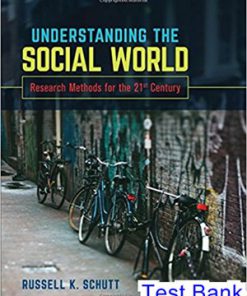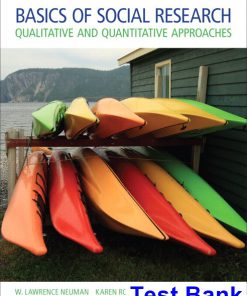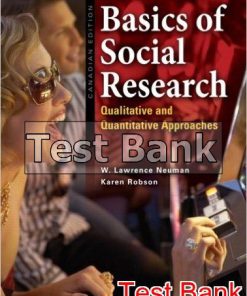Understanding Research 1st Edition Neuman Test Bank
$50.00 Original price was: $50.00.$26.50Current price is: $26.50.
Understanding Research 1st Edition Neuman Test Bank.
Understanding Research 1st Edition Neuman Test Bank

Product details:
- ISBN 10: 0205471536
- ISBN 13: 9780205471539
- Author: William Lawrence Neuman
From the Publisher: Understanding Research is an accessible and visually-appealing introduction to research across a wide range of academic fields and applied professions. It builds a broad foundation that will prepare you for more advanced courses in research and statistics; shows you how to evaluate and understand the significance of published studies; and illustrates the usefulness of research in a variety of real settings. Whether you become a producer or consumer of research, Understanding Research demonstrates that the subject is both interesting and highly relevant to your personal and working life. Key Features: Covers all major social research concepts and builds a broad foundation that will prepare students for more advanced courses in research and statistics. Develops critical reading skills to enable students to evaluate and understand the significance of published studies. Includes examples and illustrations from a broad range of academic disciplines. Engages students and illustrates utility of research in a variety of “real” settings.
Table contents:
Chapter 1: Why Do Research?
Chapter 2: Planning A Study
Chapter 3: Becoming An Ethical Researcher
Chapter 4: Sampling, How To Select A Few To Represent The Many
Chapter 5: Measuring Social Life, How Many? How Much? What Type?
Chapter 6: The Survey: Asking People Questions
Chapter 7: The Experiment
Chapter 8: Research With Non-Reactive Measures
Chapter 9: Making Sense Of The Numbers
Chapter 10: Observing People In Natural Settings
Chapter 11: Looking At The Past And Across Cultures
Chapter 12: Writing A Research Report
Appendices
COMPREHENSIVE TABLE OF CONTENTS:
Chapter 1: Why do research?
On What Basis Do You Make Decisions?
How Do We Know What We Know?
What is Empirical Social Research?
Fit the Question You Want to Answer With a Type of Social Research
Steps in the Research Process
What have you learned?
Applying what you learned.
Chapter 2: Planning a Study
Picking a Study Topic
Conducting a Review Past Studies
Focusing on a Research Question
The Research Proposal
Chapter 3: Becoming an Ethical Researcher
The Ethical Imperative
Scientific Misconduct
Ethical Issues Involving Research Participants
Ethics and the Sponsors of Research
Politics of Research
Value-Free and Objective Research
Chapter 4: Sampling, How to select a few to represent the many
How and Why do Samples Work?
Focusing on at a specific group: four types of non-random samples
Coming to Conclusions about Large Populations
Three Specialized Sampling Techniques
Inferences from a Sample to a Population
What Have You Learned?
Chapter 5: Measuring Social Life, How Many? How Much? What Type?
Why Measure?
Making Aspects of the Social World Visible
Measuring with Numbers or Words
How to Create Good Measures: Reliability and Validity
A Guide to Quantitative Measures
How to create an Index
How to create a Scale
What have you Learned?
Chapter 6: The Survey: Asking People Questions
What is a Social Survey?
How to Conduct a Survey
Writing Good Survey Questions
Effective Questionnaire Design Tips
Advantages and Disadvantages of Different Survey Formats
Survey Interviewing
Chapter 7: The Experiment
Doing Experiments in Everyday Life
What Questions Can You Answer with the Experimental Method?
Why Assign People Randomly?
Do You Speak the Language of Experimental Design?
Experimental Validity Inside and Out
What You Can See In Experimental Results with Comparison
How to be Ethical in Experiments
What did you Learn?
Chapter 8: Research With Non-Reactive Measures
Analyzing Physical Evidence for Clues About Social Life
Revealing the Content Buried Within Communication Messages
Mining Existing Statistical Sources to Answer New Questions
Answering New Questions Using Survey Data Collected by Others
Conducting Ethical Non-Reactive Research
Chapter 9: Making Sense of the Numbers
What to do once you have the numbers
How to Describe Quantitative Results
Inferring from Statistics
Conclusion
Chapter 10: Observing People in Natural Settings
What is Field Research?
Studying People in the Field
Preparing For a Field Study
Starting the Research Project
Being in the Field
Strategies for Success in the Field
Observing and Collecting Data
The Field Research Interview
Leaving the Field
Writing the Field Research Report
Ethics and the Field Researcher
Focus Groups
Chapter 11: Looking at the Past and Across Cultures
What is Historical-Comparative Research?
How to do a Historical-Comparative Research Study
Researching the Past
Research to Compare Across Cultures
Being an Ethical H-C Researcher
Chapter 12: Writing A Research Report
Why Write a Report?
The Writing Process
The Quantitative Research Report
The Qualitative Research Report
The Research Proposal
Undergraduate Research
Appendices
1. Sample Annotated Research Paper
2. Leading Academic Journals by Subject
People also search:
Understanding research 1st edition
Understanding research methods 10th edition
Understanding research methods an overview of the essentials 10th edition
Understanding research methods pdf
Understanding research articles
Instant download after Payment is complete
You may also like…
Sociology
Understanding the Social World Research Methods for the 21st Century 1st Edition Schutt Test Bank
Test Bank
Social Research Methods Qualitative And Quantitative Approaches 7th Edition Neuman Test Bank




















